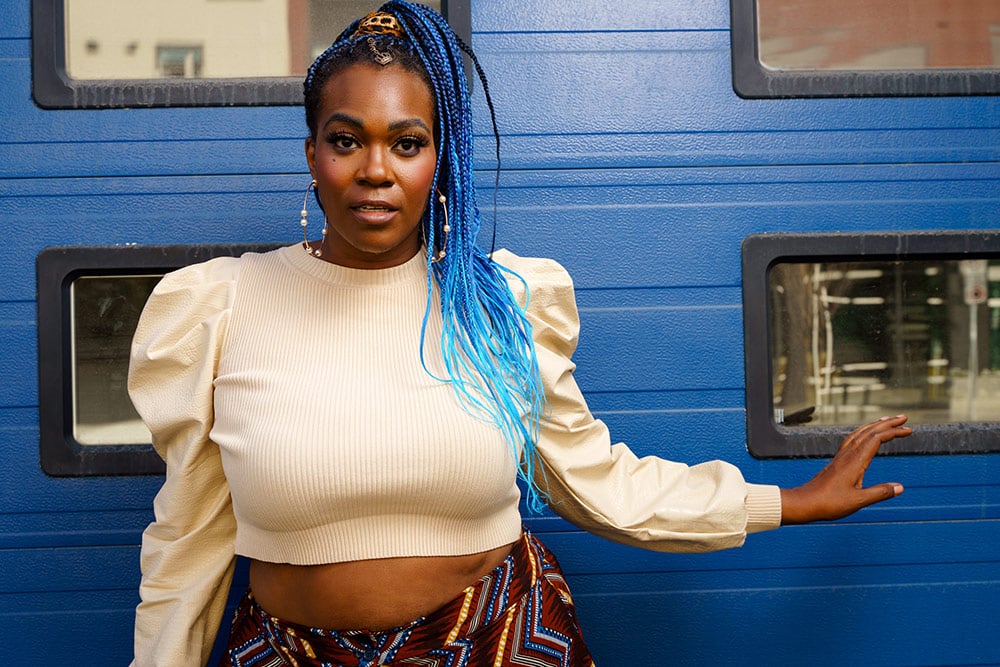The CBC’s recent story on words you should avoid because they hurt different groups blew up quickly, drawing thousands of readers.
The backlash was just as quick, with thousands of comments (don’t read them) saying the article represented political correctness gone too far.
As a comedian, I’ve heard this argument before. Comedians are sensitive to language because, as live performers, we want audiences to focus on our funny and not be derailed by our words. If we bomb, we won’t get our payment of one free drink and 50 per cent off an appetizer — so the stakes are pretty high.
We also want to express ourselves fully and be able to say what we mean, so it’s a tricky balance that can feel at times like having a sneezing fit during a high-wire walk in a sharknado.
Renowned comedy historian and B.C. native Kliph Nesteroff pointed out that this is an age-old debate in comedy in a recent and information-rich conversation on Marc Maron’s WTF podcast.
Nesteroff highlighted a 1903 editorial in a Kansas newspaper criticizing vaudeville theatres for buckling under pressure from an Irish group pushing back against Irish stereotypes on stage. What will come next, the old-timey editorial writer speculates — Black people will object to blackface? If we buckle to these groups, “say goodbye to comedy,” he laments.
Sound familiar?
This isn’t just an issue in the United States. I looked up examples of censorship in Canada and found that Canada’s first and perhaps most blatant legal case on free speech came in 1937 when the Alberta Social Credit government passed an act that would have required newspapers to print government-written “corrections” of any condemning coverage. This was the most extreme peacetime attempt to gag the press and clearly more serious than people who frame negative feedback to their use of language from other social media users as "censorship."
Also, can you imagine what those corrections would look like?
“We retract the statement about politicians embezzling and add that the government is really swell and made up of some very handsome guys with firm handshakes and also we didn’t write this from a fancy hotel room paid for by the public. Hang on a sec... (Is that room service? Have them set the tray down on the table under the chandelier.)”
Watching this freedom of speech debate unfold made me want to talk to Adora Nwofor, who is a comedian, the president of Black Lives Matter in Calgary and a friend of mine. (All three of those activities take a lot of energy, by the way.)
Nwofor and I host Cathartic Laughs workshops, where we joke about personal topics with a diverse group of funny people with the aim of having fun and maybe processing some hard stuff with humour. I have had the mind-expanding benefit of Adora correcting some of my assumptions, so I asked her what she thought about the language debate.
The interview has been lightly edited for length and clarity.
The Tyee: What’s missing in the conversation about "language to avoid" versus "freedom of speech"?
Nwofor: What’s missing in the freedom of speech conversation is that it doesn’t mean freedom from consequence. People in the margins know this already from everyday life.
Right. If you say something that other people disagree with, it might result in loss of opportunity or community connection. People with minority identities have often learned this from a young age and folks with more privilege are finding this out now all at once, and some people are not taking the news too well.
Exactly. Words carry meaning, both in their definitions in the dictionary and in how we understand them in context. To continue to skirt and overlook the meaning and the impact of words to maintain privilege or power is manipulation. Using freedom of speech to harm or to keep others down was never the intent of those early laws. Freedom of speech is to ensure those who do not have influence or have not been heard by authority can have their say. It is there to protect and empower against governments or corporations, the institutions who can truly censor us.
I have heard you say that our society doesn’t let people fail and has a focus on perfectionism, which is a white supremacy culture characteristic. So how do we incorporate playfulness and learning in this increasingly polarized discussion?
I believe that humans are not perfect, that we do not know everything and that making a misstep is necessary to grow. That being said, when the group that is not in the power position is being vulnerable and offers insight, it is never OK to use your feelings as the focus.
I would ask people of privilege to be humble. The first few times trying to connect to folx with different experiences may not go well, but it gets better, and if one truly learns and grows they can begin to navigate these tender conversations with wit and confidence, which, incidentally, are also usually the better places to be in comedy.
What should folks remember about how language can shape one’s experience? Can you share how language has shaped your experience?
Language is to communicate, but there is also more than verbal communication. For example, there is body language, facial expressions and ASL [American Sign Language]. You need to ask yourself, what are you trying to say, and what impact do you want to make?
Yes, there is also the context of who you are, how people view you, your social position, where you are communicating, who you are communicating to and so many other factors in getting ideas across to other humans.
I know just by word choice how someone feels about me and what is expected. If you add race into the equation of communicating, it can raise the stakes sometimes to the point of life or death. People in the margins know that if we mess up the consequences can be dire and there will never be a mediator, a trial or anything more than, “Well, you made that mistake so own the consequences.”
I say that no one follows the rules better than a Black woman. We must read the room at every moment to ensure our safety, never mind conveying our message. When that message is seen as too aggressive, we do not get grace or another chance. I have a PhD in wordsmithing as a result.
What can folks remember about how to support each other in learning how to take perspective and communicate with kindness?
Know that you can always show your growth and that is really the best way to support other people. Apply what you have learned far and wide, even when it is not comfortable. What happens is that this becomes the new norm, for you and those around you. We need to get enough people focused on growth rather than maintaining the status quo or becoming stoic.
When I am educating folx in my community, I do my best to say that the correction is about language and passively assume that it was a misstep. I do this because then, if someone says something that belittles another group, I assume it is an accident, I quickly correct them and share an alternative word or phrasing. I do this to assure my message can land before the misstep can become the focus. Allowing folx to grow rather than forcing an in-the-moment change is kindness.
Also, if this becomes a regular practice, folx will either accept this is how you exist, that you will help them update language even if it is uncomfortable, or they will move on. If someone refuses to update harmful behaviour then we know they do not want to make safety the priority and that harm is more important to them than positive impact on people, community and society as a whole. Consent is also very important in this conversation and ensuring communicating and understanding take precedence over hierarchy.
As someone who has had the benefit of having my words and thinking reframed by you more than once, thanks for this work. It’s helped me learn and is evolving how I relate to others.
It’s an honour to connect with different people in the Cathartic Laughs community where I can experience real-time authenticity, growth and grace. Intentionally supportive spaces can give you practice in learning about people’s differences. I hope that folx who feel overwhelmed with controversial words find an opportunity to be around people different from themselves in a healthy way. It's a blessing to me to be educated through experience and watch people blossom when they know they are free to flourish. Even if we don’t know all the answers right now, it’s OK, because we keep talking, listening, learning and that's a win. ![]()
Read more: Rights + Justice, Media
















Tyee Commenting Guidelines
Comments that violate guidelines risk being deleted, and violations may result in a temporary or permanent user ban. Maintain the spirit of good conversation to stay in the discussion.
*Please note The Tyee is not a forum for spreading misinformation about COVID-19, denying its existence or minimizing its risk to public health.
Do:
Do not: